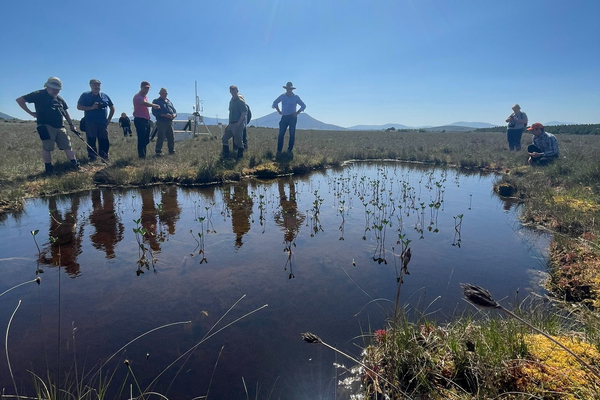The Minister for Agriculture, Food and the Marine, Charlie McConalogue, has launched a new primary school programme designed to educate children on the environmental and economic advantages of our blanket bogs. The programme, which was developed by the Heritage Council as part of LIFE IP Wild Atlantic Nature, is being rolled out to schools in Donegal, Mayo, Galway, Sligo and Leitrim from September following the successful completion of a pilot phase.
LIFE IP Wild Atlantic Nature is an EU-funded environmental project aiming to improve Ireland’s performance in conserving habitats and in particular improving the quality of our blanket bogs, focusing primarily on the blanket bogs in the northwest of the country. It is coordinated by the National Parks and Wildlife Service via the Department of Housing, Local Government and Heritage with nine additional partners including the Heritage Council and Department of Agriculture, Food and the Marine (DAFM).
The education programme aspect of the project takes children on a journey through the wonders of bog habitat, learning about how the bogs can control floods, provide clean drinking water and high-quality food, support biodiversity and help tackle climate change by storing millions of tonnes of carbon. As our future farmers, children are learning how to actively manage habitats through sustainable farm practices.
The learning begins in the classroom, where pupils learn about the key plants and bog habitat and how to use the habitat assessment scorecard developed with DAFM as part of Wild Atlantic Nature Results-Based agri-environmental Payment Scheme (RBPS). A subsequent field trip to a local bog is organised where a bog plant identification swatch is used to observe whether the plants found are positive or negative indicators of the condition of a bog. Back in class, the scores are calculated to determine if their local blanket bog was considered healthy or if it required a helping hand from farmers and the local community to improve its condition.
The final phase of the programme involves a follow-up project designed to consolidates the pupils’ learning.
The education programme was developed by the Irish Peatlands Conservation Council (IPCC) and NatureNorthWest, and will be delivered by heritage specialists from the Heritage Council’s Heritage in Schools Scheme.
Speaking at the launch of the programme at Crannóg Buí National School in Ardara, Donegal, Minister for Agriculture, Food and the Marine, Charlie McConalogue, said, “since LIFE IP Wild Atlantic Nature commenced in 2021, my department has been a proud partner with the National Parks and Wildlife Service and others in this worthy project, helping to deliver a pilot Results-Based agri-environmental Payment Scheme (RBPS) for 840 farmers. To date more than €3 million has been paid directly to farmers under the scheme, and I want to acknowledge the excellent work that the farmers who manage these blanket bogs have done in improving the quality of the habitats under their care. Ireland is at the forefront in terms of results-based agri-environment schemes in Europe and is demonstrating how RBPS can deliver co-benefits for farmers and the environment.”
“I also want to thank the staff and pupils at Crannóg Buí National School for welcoming us and for engaging in the excellent education programme I saw demonstrated so passionately today. I would strongly encourage other primary schools in the project areas to consider taking the programme when the new school term begins in September.”
Chairperson of the Heritage Council Martina Moloney said, “in recent years, The Heritage Council has been deepening its relationship with the education sector and the launch of this innovative new programme is further acknowledgment of the importance of heritage in education. With our natural heritage under severe threat at the moment, it is really wonderful to see the launch of this initiative at this time and I would like to congratulate all those involved in bringing it to fruition.”
CEO of the Heritage Council Virginia Teehan said, “the intergenerational aspect of this programme is what makes it particularly special, as many of the pupils will come from farming families caring for the bog habitat and will already have an intimate relationship with the land. The programme will enable them to broaden that relationship and to engage on a deeper level with their family and friends, encouraging shared responsibility for its upkeep. Facilitating this transfer of information and skills from one generation to the next is something The Heritage Council will always support.”
Project Manager of LIFE IP Wild Atlantic Nature, Dr Derek McLoughlin said, “LIFE IP Wild Atlantic Nature aims to develop and test long-term solutions related to nature, agriculture and climate in a way that works for everyone in the local community. We strongly depend on landowners to manage the land in a sustainable way and to deliver the goods and services that the public want and need. As the next generation of farmers emerge, it is important that they can carry on the farming traditions in these important areas, and build on existing knowledge and experience that landowners have. For this to happen, we must ensure coherent messages on the use of land and develop appropriate policy to deliver good social and environmental outcomes in a way that can support farmers’ livelihoods.”



